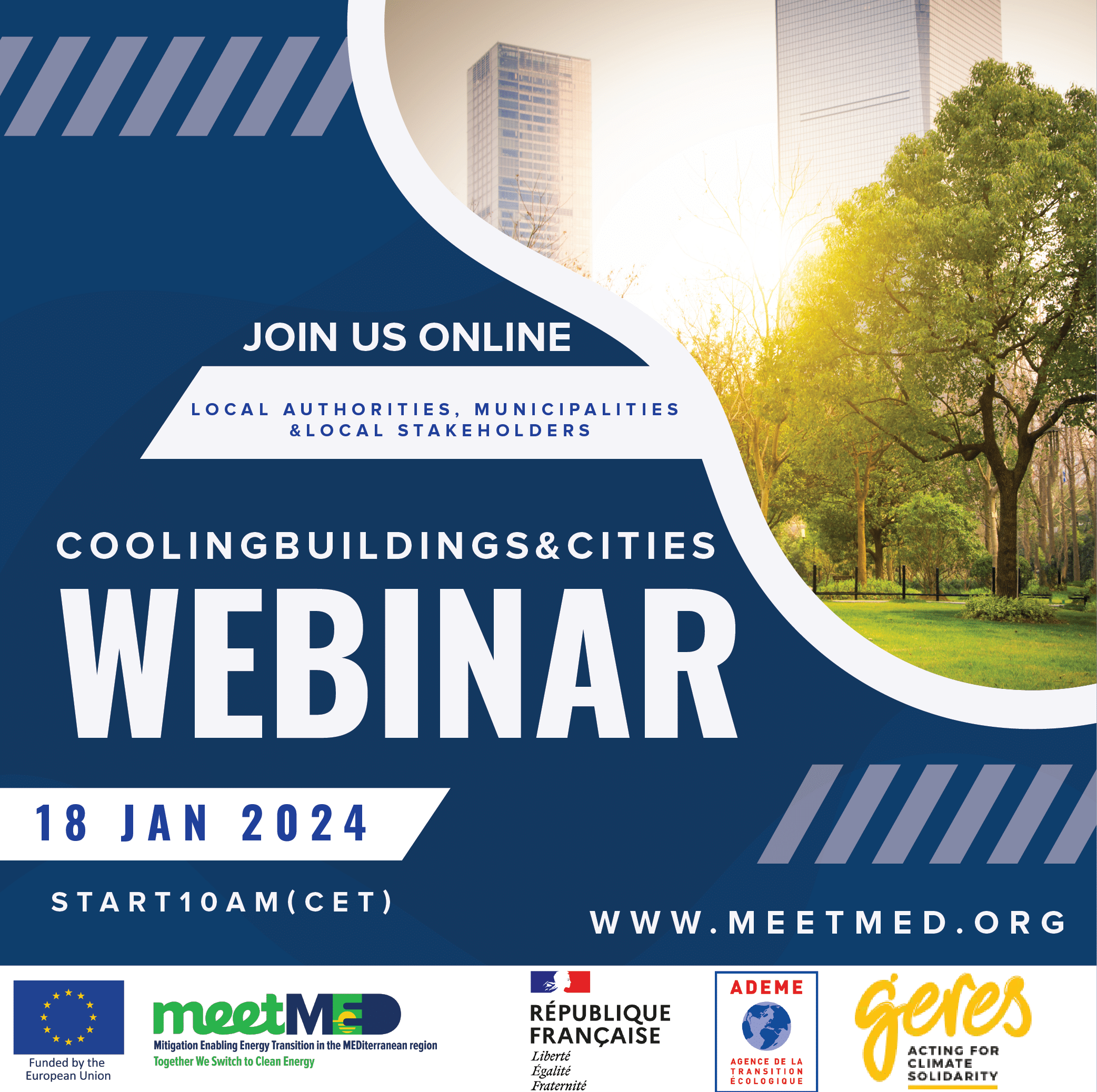
Webinar “Cooling Cities and Buildings”
Overview of challenges and practices in South and East Mediterranean countries
With the ongoing commitment of the meetMED project funded by the European Union to fostering energy efficiency measures in building sector, ADEME (French Environment and Energy Management Agency) in cooperation with Geres NGO oragnised a webinar entitled “Cooling Cities and Buildings” on 18 January 2024, 10:00 – 11:30 (CET Time).
This webinar is part of a series of three courses targeting local authorities and national agencies in the Mediterranean to build a roadmap for disseminating the practices & tools at the national and regional scale.
Different solutions to improve comfort, reduce the impact of the Urban Heat Island effect, rationalize energy consumption, and address environmental impacts related to urban form in MED cities were presented and discussed. Through a multidisciplinary approach and crossed regards between energy experts and urban planning experts, it aimed at giving keys to local authorities in implementing adequate solutions in their context, adapting their cities and buildings to climate change.
Background
Urban overheating is a particularly critical issue in southern and eastern Mediterranean cities, due to their high exposure to increasing heat waves, droughts and Urban Heat Island effect, in a context marked by a growing trend towards urbanization especially in coastal areas.
Solutions for improving comfort and reducing economic and environmental impacts relate to urban form, building technologies and systems, as well as policies and residents’ behaviors.
Although heir to a long tradition of bioclimatic urban planning and housing, cities in the southern and eastern Mediterranean are today marked by trends that do not offer sustainable solutions in environmental, economic and social terms. There is thus an urgent need to work on more efficient equipment at household level, but also to reduce needs by improving the thermal performance of buildings and promoting alternative cooling solutions at different scales, from the building to the city.
ADEME commissioned the NGO Geres to draw up a report with a view to exploring the reasons for these trends, and proposing solutions adapted to the Mediterranean context.
Based on a historical reading of urban development and an analysis focusing on the role of the various stakeholders (institutional, professional, civil society, citizens), this report provides an overview of the issues and stakeholders involved in cooling buildings and cities in southern and eastern Mediterranean countries, from a cross-disciplinary perspective. It specifically documents the field of practices implemented by residents themselves, and makes recommendations on the levers to be favored to encourage changes in behavior and practices according to the different urban morphologies of southern and eastern Mediterranean countries.
This webinar is targeting local authorities and national agencies to discuss the key elements of this report and gather feedbacks from participants. It aims to stimulate dialog on appropriate solutions to help Mediterranean cities and buildings adapt to climate change, valuing present and past experiences from energy experts and city planning authorities.
Agenda
- Welcome Address: Alicia TSITSIKALIS, WP3 leader, ADEME (Download PPT)
- Urban Cooling challenges in Mediterranean Cities, Clémentine Laratte, Territories, climate and energy program Lead, Geres
- Cooling practices adapted to different urban typologies, including solutions implemented by local residents, Marc Glass, Energy efficiency & housing project manager Geres
- Study case – Bioclimatic construction in Tata (Morocco) and impact on cooling : Fatima-Azzahra Bendahmane, Architect, specialized in bioclimatic architecture. Presentation of her work and conception of the CIE of Tata (Morocco)
- Q&A
The webinar will be in French with simultaneous translation in English and Arabic

